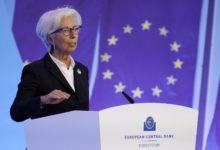Argentina Registers 6.6% CPI in February; Inflation Numbers Blast Past 100% YoY for First Time Since the 90s

The National Institute of Statistics and Census of Argentina released February’s numbers for the consumer price index (CPI), registering an increase of 6.6%, a consequence of the rises in prices of food and beverages principally. The number is among the highest in the history of Argentina, reaching more than 100% growth year-on-year (YoY), something that has alarmed local analysts.
Argentina Registers Record CPI Levels in February
The National Institute of Statistics and Census in Argentina released the inflation numbers for February, alarming local analysts. According to the report, February’s monthly CPI reached 6.6%, a higher number than the 6% registered in January. The rise was mostly caused by the increase in prices of food and beverages, which grew by 9.8%, hitting the pockets of Argentines. Inside this sector, meats spearheaded the hike, with prices rising by more than 30% in some cases.
Inflation reached record yearly levels, with prices rising 102.5% YoY, the highest number in more than 30 years. Even with this unprecedented behavior, analysts are predicting a further acceleration for March, which would thwart the expectations of the government of maintaining the CPI under 100% for 2023.
The numbers of Argentina are the second highest in Latam, only trailing behind Venezuela’s year-on-year CPI, which reached 155.8% in October.
Losing the Battle
Local economists have expressed their worries about the acceleration of prices in the country, calling for changes in the economic policies of the government of Alberto Fernandez. The government has been trying to contain inflation by establishing price control mechanisms since last October, but these movements have not achieved the desired goal.
Martin Vauthier, an economist from Anker Latam, a financial counseling group, stated:
A stabilization program is required with a strong fiscal component, an exchange rate consistent with the accumulation of reserves, and a consistent monetary policy that serves to reverse expectations and rebuild the demand for money.
Ecolatina’s Research Chief, Santiago Manoukian, also declared:
The main concern is that the rise was driven by food and beverages, with a greater impact in the consumption basket of the poorest households.
The rise in prices in Argentina is leading some retailers to fix prices in U.S. dollars to avoid constant repricing, a phenomenon that is also common in Venezuela.
On March 4, President Alberto Fernandez communicated the creation of a Latam-wide mechanism to fight inflation. The new mechanism would integrate a clearing system, allowing countries to exchange goods experiencing price hikes for others between Argentina, Brazil, Cuba, Colombia, and Mexico.







 Bitcoin
Bitcoin  Ethereum
Ethereum  Tether
Tether  USDC
USDC  Dogecoin
Dogecoin  TRON
TRON  Cardano
Cardano  Chainlink
Chainlink  Bitcoin Cash
Bitcoin Cash  LEO Token
LEO Token  Litecoin
Litecoin  Dai
Dai  Monero
Monero  Ethereum Classic
Ethereum Classic  Stellar
Stellar  Stacks
Stacks  OKB
OKB  Cronos
Cronos  Hedera
Hedera  Cosmos Hub
Cosmos Hub  Theta Network
Theta Network  Maker
Maker  Gate
Gate  KuCoin
KuCoin  Algorand
Algorand  Polygon
Polygon  Tether Gold
Tether Gold  NEO
NEO  EOS
EOS  Tezos
Tezos  Zcash
Zcash  TrueUSD
TrueUSD  Synthetix Network
Synthetix Network  Bitcoin Gold
Bitcoin Gold  IOTA
IOTA  Holo
Holo  0x Protocol
0x Protocol  Dash
Dash  Zilliqa
Zilliqa  Siacoin
Siacoin  Enjin Coin
Enjin Coin  Ravencoin
Ravencoin  Basic Attention
Basic Attention  Qtum
Qtum  Decred
Decred  Ontology
Ontology  NEM
NEM  Lisk
Lisk  Nano
Nano  Pax Dollar
Pax Dollar  Numeraire
Numeraire  DigiByte
DigiByte  Waves
Waves  Status
Status  Huobi
Huobi  Hive
Hive  Steem
Steem  BUSD
BUSD  Ren
Ren  OMG Network
OMG Network  Bitcoin Diamond
Bitcoin Diamond  Bytom
Bytom  Kyber Network Crystal Legacy
Kyber Network Crystal Legacy  HUSD
HUSD